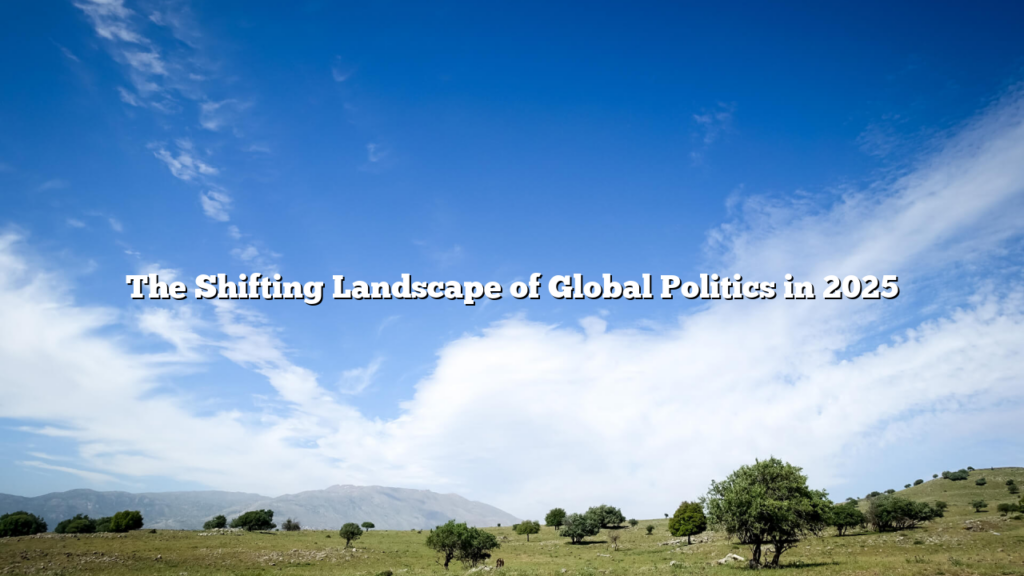
The Shifting Landscape of Global Politics in 2025
The political landscape in 2025 is rapidly evolving, shaped by elections, international conflicts, economic policies, and climate initiatives. As global powers navigate economic recovery, diplomatic tensions, and technological advancements, governments are making strategic decisions that will impact the future. This article explores some of the most pressing political developments, from the United States presidential election to geopolitical rivalries and climate policy debates.
U.S. Presidential Election: A Defining Moment
The 2025 U.S. presidential election is a major political event with global implications. With the economy, healthcare, immigration, and foreign policy at the center of debate, candidates are competing to shape America’s future.
The Biden administration has focused on economic recovery, green energy policies, and strengthening international alliances. However, opposition candidates are advocating for tax cuts, stricter immigration controls, and a shift in foreign policy. Voter turnout is expected to be high, reflecting public concerns over inflation, job creation, and social issues.
The election’s outcome will influence international relations, particularly U.S. policies on China, Russia, and NATO. A shift in leadership could lead to changes in trade agreements, military strategies, and diplomatic approaches.
Rising Nationalism in Europe
Across Europe, nationalist movements are gaining traction, driven by concerns over immigration, economic stability, and national sovereignty. In France, Germany, and Italy, political parties advocating for stricter border controls and economic independence from the European Union (EU) are gaining support.
Brexit’s long-term effects continue to shape UK politics, with debates over trade agreements and domestic policies dominating discussions. Meanwhile, the EU is working to maintain unity as countries disagree on climate goals, digital regulations, and security policies.
Germany and France, as key EU leaders, are pushing for stronger defense cooperation and energy independence, particularly in response to geopolitical tensions in Eastern Europe. The rise of nationalist sentiment across the continent could reshape the future of the EU and its role in global politics.
The U.S.-China Rivalry: A Struggle for Global Influence
The U.S.-China relationship remains a critical issue in global politics, with trade disputes, military strategies, and technological competition defining their interactions. While both countries have expressed the need for cooperation on climate change and cybersecurity, tensions over Taiwan, trade policies, and artificial intelligence (AI) development continue to escalate.
China’s Belt and Road Initiative (BRI) has expanded its economic influence across Asia, Africa, and Latin America, challenging U.S. dominance in global trade. Meanwhile, the U.S. is strengthening alliances in the Indo-Pacific region, working with Japan, South Korea, and Australia to counter China’s influence.
The technological race between the two superpowers is also intensifying, with AI, semiconductor production, and space exploration at the forefront. Both countries are investing heavily in innovation, aiming to secure leadership in emerging industries.
Middle East Politics: Shifting Alliances and Regional Conflicts
The Middle East remains a region of geopolitical complexity, with shifting alliances and ongoing conflicts. Iran’s nuclear program continues to be a major concern for Western nations, with diplomatic negotiations attempting to prevent further escalation.
Saudi Arabia and the United Arab Emirates (UAE) are expanding their economic influence, investing in renewable energy and technology to reduce reliance on oil. Meanwhile, Israel’s relations with neighboring Arab countries are evolving through diplomatic agreements, but tensions with Palestine persist.
The conflicts in Syria and Yemen remain unresolved, with international efforts focusing on humanitarian aid and peace negotiations. As Middle Eastern countries navigate economic reforms and security challenges, the region’s political landscape continues to evolve.
Climate Politics: A Global Challenge
Climate change is at the center of global political discussions, with governments facing pressure to implement policies that reduce carbon emissions and invest in sustainable energy. The United Nations Climate Conference has brought nations together to discuss commitments to green energy, but disagreements over funding and implementation remain.
Developing countries are calling for financial support from wealthier nations to transition to sustainable practices, while some governments continue to prioritize economic growth over environmental regulations. The shift toward electric vehicles, renewable energy, and carbon neutrality is progressing, but the pace varies across regions.
Private sector involvement in climate initiatives is increasing, with corporations investing in green technologies and governments offering incentives for sustainable business practices. However, balancing https://blogninos.itagui.gov.co/ with environmental responsibility remains a challenge for policymakers worldwide.
Conclusion
The global political landscape in 2025 is defined by elections, geopolitical rivalries, and climate policies. The outcome of the U.S. presidential election will shape international relations, while Europe’s rising nationalism challenges the unity of the EU. The U.S.-China rivalry continues to influence trade, technology, and military strategies, and the Middle East faces ongoing political shifts.
As world leaders navigate these complex issues, diplomacy, cooperation, and strategic policymaking will be essential for global stability. The decisions made today will shape the political and economic future for years to come, making 2025 a pivotal year in international affairs.



